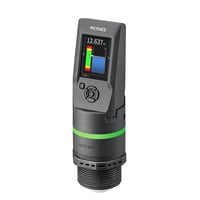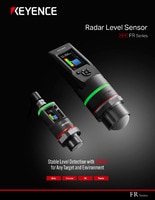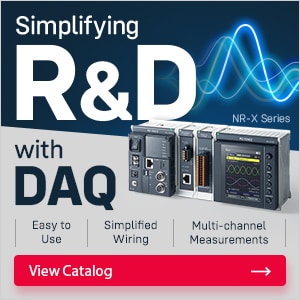
Radar Level Sensor
FR series
Long range Sensor main unit Chemical model FR-LP20

*Please note that accessories depicted in the image are for illustrative purposes only and may not be included with the product.
Specifications
Model | FR-LP20 | |||
Type | Long range Chemical model | |||
Measuring range | Up to 20 m 65.6'*1 | |||
Display range | Up to 25 m 82.0'*1 | |||
Measurable dielectric constant of medium | 2 or higher*2 | |||
Resolution | 1 mm 0.04" | |||
Precision | Up to 0.1 m 0.3': ±10 mm 0.39"; | |||
Response time | 0.4 s, 1.5 s, 4 s (default value), 10 s | |||
Tank pressure | -0.1 to +0.1 Mpa | |||
Material | Tank interior | Lens: PTFE | ||
Housing | PPS PPSU | |||
Connection diameter | G1-1/2 (40 A) | |||
Output | No. of control outputs | Maximum 5 | ||
Control output/auxiliary output | NPN/PNP open collector (switching type) | |||
Analog output | 0–20 mA/4–20 mA maximum load resistance 260 Ω | |||
External input | ─ | |||
Network compatibility | IO-Link v1.1/COM2 | |||
Analog output accuracy | Resolution | 1 mm 0.04"*4 | ||
Zero accuracy | ±0.1 mA (zero point = 4 mA)*4 | |||
F.S. accuracy | ±0.2 mA (full-scale = 20 mA)*4 | |||
Power supply | Power voltage | 24 VDC + 25%/–20% | ||
Power consumption | 98 mA or less (Excluding Load Current) | |||
Environmental resistance | Ambient temperature | Display part when combined and separated: –10 to +50°C 14°F to 122°F (no freezing)*5*6 | ||
Relative humidity | Up to 85% RH (no condensation) | |||
Temperature of coupling used | –10 to +85°C 14°F to 185°F (no freezing)*5*6 | |||
Vibration resistance | 10–500 Hz Power spectral density: 0.816 G2; X, Y and Z directions | |||
Shock resistance | 100 m/s2 (10 G), 16 ms pulses, 1000 times each for X, Y and Z directions | |||
Enclosure rating | IP67 (IEC60529), Enclosure Type 4X (NEMA250) | |||
Protection circuit | Protection against reverse power connection, power supply surges, output overcurrent protection, and output surges | |||
Weight | Approx. 400 g 14.11 oz | |||
*1 Guaranteed value in water with the recommended installation. Static water can be measured up to the edge of the lens. An undetectable area on the short-range side is created due to the environment and measurement medium. The maximum measuring distance is also shortened. | ||||




